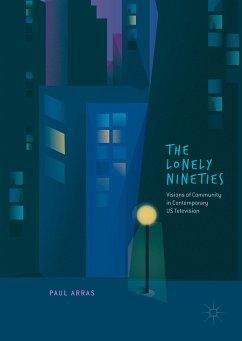This book examines the most popular American television shows of the nineties-a decade at the last gasp of network television's cultural dominance. At a time when American culture seemed increasingly fragmented, television still offered something close to a site of national consensus. The Lonely Nineties focuses on a different set of popular nineties television shows in each chapter and provides an in-depth reading of scenes, characters or episodes that articulate the overarching "ideology" of each series. It ultimately argues that television shows such as Seinfeld, Friends, Law & Order and The Simpsons helped to shape the ways Americans thought about themselves in relation to their friends, families, localities, and nation. It demonstrates how these shows engaged with a variety of problems in American civic life, responded to the social isolation of the age, and occasionally imagined improvements for communityin America.
Dieser Download kann aus rechtlichen Gründen nur mit Rechnungsadresse in A, B, BG, CY, CZ, D, DK, EW, E, FIN, F, GR, HR, H, IRL, I, LT, L, LR, M, NL, PL, P, R, S, SLO, SK ausgeliefert werden.









